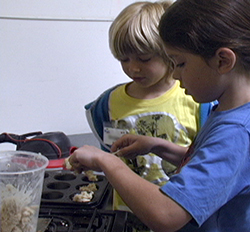“Education is the kindling of a flame, not the filling of a vessel.” ― Socrates
Wouldn’t it be wonderful if we could give our children the drive to ask questions and pursue answers until they are satisfied? To a young child, the world is like a huge room full of tables loaded with every imaginable type of food in existence. They want to run in and sample everything until they are full. Every day they can hardly wait to run out and discover something new. Unfortunately, our children are often discouraged from enjoying the riches of knowledge right there in front of them. Our schools force-feed them and demand that they remember certain foods and ignore other foods. If they happen to discover that they really like something in school, they are not allowed to pursue that line of knowledge… they are dragged away and told to try something else.
It is up to parents to develop and expand the inquisitiveness of their children. At Rock-it Science we encourage silly thoughts, silly stories, and practical experiments so that children will relax and play with the experiments and let their minds wander into the pretend world of Jack and Jill, the evil Mister Fred, and the Acme Store of Everything. As silly as all of this seems, it creates just the right attitude for solving very complex problems. When any person opens their horizons so that they look at the solution coming from the Acme Store of Everything (where they can instantly get anything that they can imagine), they will then be open for a wide range of solutions. After they have a list of possible solutions, then they can evaluate them and find a practical way to solve the problem.
This combination of pretend solutions, and then practical evaluation of the solutions, is called creative problem solving. We bring it to life by telling a crazy story in which evil Mister Fred cooks up a plan to take over the world, or at least make everyone else miserable, and then Jack and Jill get caught up in trying to stop evil Mister Fred. The students then brainstorm for possible solutions and then they do experiments to test the practicality of one or more solutions.
 This same procedure can be used right in your own home. If you are cooking something like cookies, you could tell your child about how Peter the Paper tiger snuck into the kitchen and chewed holes in your cookie recipe. You really wanted to make some chocolate chip cookies, but part of the recipe is now missing… you don’t know how much sugar to add. Then let your child imagine ways to solve the problem. Of course, after that, you make several small batches of cookies with different amounts of sugar to see how they taste.
This same procedure can be used right in your own home. If you are cooking something like cookies, you could tell your child about how Peter the Paper tiger snuck into the kitchen and chewed holes in your cookie recipe. You really wanted to make some chocolate chip cookies, but part of the recipe is now missing… you don’t know how much sugar to add. Then let your child imagine ways to solve the problem. Of course, after that, you make several small batches of cookies with different amounts of sugar to see how they taste.
This type of creative problem solving can be used to see how often to water plants, how much detergent to use while washing dishes, what weight of hammer works best to pound nails, what pressure works best in bicycle tires… anything that can be changed becomes an opportunity for a story and an experiment.
“The more I live, the more I learn. The more I learn, the more I realize, the less I know.” ― Michel Legrand
The most dangerous thing that can happen to any person is to start thinking that they know more than other people. As soon as that happens, they resist playing with thoughts, ideas and things because they are afraid that people will think less of them for playing with ‘toys’. It is truly depressing when a person will not play with something to see how it works because they fear that they will not be able to come up with a solution. They might say that it is not dignified for a person such as themselves to play with idle toys. If we can instill the attitude in our children that every person on this planet knows something that they don’t know, then we are on the right track.
“All the world is my school and all humanity is my teacher.” ― George Whitman
The poor soul living out of a grocery cart by the creek knows what it is like to sleep under a bridge in freezing cold weather, how it feels to discover that someone took their only pair of dry socks, and how to get free food at the local charities. We can learn something from everyone and we can make friends by sharing what we have learned with anyone who asks. Everyone who actively learns and shares their knowledge with others is a benefit to society. Conversely, anyone who does not actively learn and share is a burden to society. Every person is a rich depository of knowledge to those who hunger to learn more each day.

Leave A Comment
You must be logged in to post a comment.